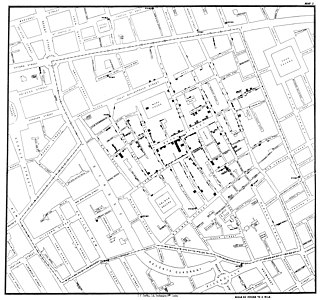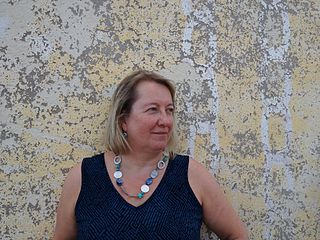Related Research Articles

Human geography or anthropogeography is the branch of geography which studies spatial relationships between human communities, cultures, economies, and their interactions with the environment, examples of which include urban sprawl and urban redevelopment. It analyzes spatial interdependencies between social interactions and the environment through qualitative and quantitative methods.
Social geography is the branch of human geography that is interested in the relationships between society and space, and is most closely related to social theory in general and sociology in particular, dealing with the relation of social phenomena and its spatial components. Though the term itself has a tradition of more than 100 years, there is no consensus on its explicit content. In 1968, Anne Buttimer noted that "[w]ith some notable exceptions, (...) social geography can be considered a field created and cultivated by a number of individual scholars rather than an academic tradition built up within particular schools". Since then, despite some calls for convergence centred on the structure and agency debate, its methodological, theoretical and topical diversity has spread even more, leading to numerous definitions of social geography and, therefore, contemporary scholars of the discipline identifying a great variety of different social geographies. However, as Benno Werlen remarked, these different perceptions are nothing else than different answers to the same two questions, which refer to the spatial constitution of society on the one hand, and to the spatial expression of social processes on the other.

Economic geography is the subfield of human geography that studies economic activity and factors affecting it. It can also be considered a subfield or method in economics. There are four branches of economic geography.
Feminist geography is a sub-discipline of human geography that applies the theories, methods, and critiques of feminism to the study of the human environment, society, and geographical space. Feminist geography emerged in the 1970s, when members of the women's movement called on academia to include women as both producers and subjects of academic work. Feminist geographers aim to incorporate positions of race, class, ability, and sexuality into the study of geography. The discipline has been subject to several controversies.
Political geography is concerned with the study of both the spatially uneven outcomes of political processes and the ways in which political processes are themselves affected by spatial structures. Conventionally, for the purposes of analysis, political geography adopts a three-scale structure with the study of the state at the centre, the study of international relations above it, and the study of localities below it. The primary concerns of the subdiscipline can be summarized as the inter-relationships between people, state, and territory.

Cultural geography is a subfield within human geography. Though the first traces of the study of different nations and cultures on Earth can be dated back to ancient geographers such as Ptolemy or Strabo, cultural geography as academic study firstly emerged as an alternative to the environmental determinist theories of the early 20th century, which had believed that people and societies are controlled by the environment in which they develop. Rather than studying pre-determined regions based upon environmental classifications, cultural geography became interested in cultural landscapes. This was led by the "father of cultural geography" Carl O. Sauer of the University of California, Berkeley. As a result, cultural geography was long dominated by American writers.

Critical geography is theoretically informed geographical scholarship that promotes social justice, liberation, and leftist politics. Critical geography is also used as an umbrella term for Marxist, feminist, postmodern, poststructural, queer, left-wing, and activist geography.
Neil Robert Smith was a Scottish geographer and Marxist academic. He was Distinguished Professor of Anthropology and Geography at the Graduate Center of the City University of New York, and winner of numerous awards, including the Globe Book Award of the Association of American Geographers.
Marxist geography is a strand of critical geography that uses the theories and philosophy of Marxism to examine the spatial relations of human geography. In Marxist geography, the relations that geography has traditionally analyzed — natural environment and spatial relations — are reviewed as outcomes of the mode of material production. To fully understand geographical relations, on this view, the social structure must also be examined. Marxist geography attempts to change the basic structure of society.
William Wheeler Bunge Jr. was an American geographer active mainly as a quantitative geographer and spatial theorist. He also became a radical geographer and anti-war activist in the US and Canada.

Antipode: A Radical Journal of Geography is a peer-reviewed scientific journal published five times per year by Wiley-Blackwell and produced by The Antipode Foundation. Its coverage centers on critical human geography and it seeks to encourage radical spatial theorizations based on Marxist, socialist, anarchist, anti-racist, anticolonial, feminist, queer, trans*, green, and postcolonial thought. Originally inspired by the social justice movements of the 1960s, the journal supports progressive causes through the work of the Antipode Foundation, a UK registered charity. Antipode is also known for its online "Interventions", its book series, and its diverse workshops and lectures. The chief co-editors are Sharad Chari, Tariq Jazeel, Katherine McKittrick, Jenny Pickerill and Nik Theodore.
Cindi Katz, a geographer, is Professor in Environmental Psychology, Earth and Environmental Sciences, American Studies, and Women's Studies at the CUNY Graduate Center. Her work concerns social reproduction and the production of space, place and nature; children and the environment; the consequences of global economic restructuring for everyday life; the privatization of the public environment, the intertwining of memory and history in the geographical imagination, and the intertwined spatialities of homeland and home-based security. She is known for her work on social reproduction and everyday life, research on children's geographies, her intervention on "minor theory", and the notion of counter-topography, which is a means of recognizing the historical and geographical specificities of particular places while inferring their analytic connections to specific material social practices.
Noel Castree FAcSS is a British geographer whose research has focused on capitalism-environment relationships and, more recently, on the role that various experts play in discourses about global environmental change. He is currently the editor-in-chief of the peer-reviewed journal Progress in Human Geography.

The sociology of space is a sub-discipline of sociology that mostly borrows from theories developed within the discipline of geography, including the sub fields of human geography, economic geography, and feminist geography. The "sociology" of space examines the social and material constitution of spaces. It is concerned with understanding the social practices, institutional forces, and material complexity of how humans and spaces interact. The sociology of space is an inter-disciplinary area of study, drawing on various theoretical traditions including Marxism, postcolonialism, and Science and Technology Studies, and overlaps and encompasses theorists with various academic disciplines such as geography and architecture. Edward T. Hall developed the study of Proxemics which concentrates on the empirical analysis of space in psychology.

Eric Sheppard is a British and American geographer, and Professor of Economic geography at UCLA.
J. Richard Peet is a retired professor of human geography at the Graduate School of Geography at Clark University in Worcester MA, USA. Peet received a BSc (Economics) from the London School of Economics, an M.A. from the University of British Columbia, and moved to the USA in the mid-1960s to complete a PhD in Geography from the University of California, Berkeley. He began teaching at Clark University shortly after completing his PhD from Berkeley, and has remained there with secondments in Australia, Sweden and New Zealand.

Diana Liverman is a retired Regents Professor of Geography and Development and past Director of the University of Arizona School of Geography, Development and Environment in the College of Social and Behavioral Sciences in Tucson, Arizona.

Anne Buttimer was an Irish geographer. She was emeritus professor of geography at University College, Dublin.
Janice Jones Monk is an Australian-American feminist geographer and researcher in the South West United States, and an Emeritus Professor at the University of Arizona School of Geography, Development and Environment.
The University of Arizona School of Geography, Development and Environment is an academic department and professional school for geographical education and urban and regional development, GIS, development practice, and environmental studies. Degrees conferred include Bachelor of Arts (BA), Bachelor of Science (BS), Master of Arts (MA), Master of Science (MS), and Doctor of Philosophy (PhD).
References
- ↑ "Geographer Sallie Marston Named Regents Professor". 16 April 2021.
- ↑ "AAG Honors".
- ↑ Marston, Sallie A. (2000). "The social construction of scale". Progress in Human Geography. 24 (2): 219–242. doi:10.1191/030913200674086272. S2CID 34833154.
- ↑ "World Regions in Global Context: Peoples, Places, and Environments".
- ↑ "The SAGE Handbook of Social Geographies". 5 February 2022.
- ↑ Knox, Paul L.; Marston, Sallie A. (8 January 2015). Human Geography: Places and Regions in Global Context. Pearson. ISBN 978-0321984241.
- ↑ The SAGE Handbook of Social Geographies. SAGE Publications. 2010. ISBN 9781412935593.
- ↑ "Google Scholar".
- ↑ Mitchell, Katharyne; Marston, Sallie A.; Katz, Cindi (July 2003). "Introduction: Life's Work: An Introduction, Review and Critique". Antipode. 35 (3): 415–442. doi:10.1111/1467-8330.00333.
- ↑ Jones, John Paul; Leitner, Helga; Marston, Sallie A.; Sheppard, Eric (January 2017). "Neil Smith's Scale: Neil Smith's Scale". Antipode. 49: 138–152. doi: 10.1111/anti.12254 .
- ↑ "Staff". 7 June 2019.
- ↑ "23rd Ray Davies Lifetime Humanitarian Achievement Award Luncheon".